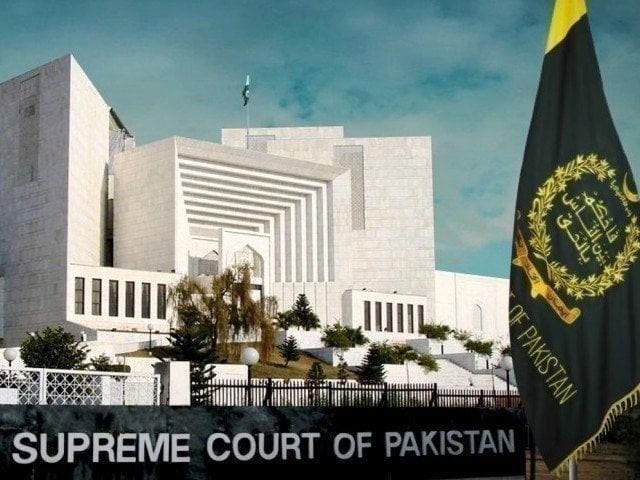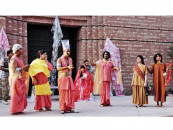SC may strike down amendments
Supreme Court's clarification on the ECP's reserved seats delay may block the government's constitutional amendment

Following the Supreme Court's clarification on the Election Commission of Pakistan (ECP) application regarding the implementation of the July 12 order in the reserved seats case, the fate of the proposed constitutional amendment remains uncertain, as it may be struck down by the apex court due to several legal defects.
Although the government has prepared to table the constitutional amendment bill in both houses of parliament today (Sunday), the move is expected to face legal challenges.
Similarly, the ECP may face issues due to its failure to fulfill its constitutional obligation by implementing the July 12 order.
Serious questions have been raised about the conduct of the polls supervisory body due to its failure to hold the general elections within the mandated 90 days.
Serious concerns have been raised about the fairness of the Feb 8 general elections, with the PTI directly accusing the ECP of complicity.
The commission misinterpreted the Jan 13 order by failing to declare the PTI as a parliamentary party. Additionally, the largest party was denied reserved seats.
When the election tribunals began investigating the controversy surrounding the Form 45 and Form 47 results, the government empowered the ECP to appoint retired judges to these tribunals.
Former Senator Mustafa Nawaz Khokhar noted that on the day Pakistan’s Constitution was adopted, Zulfiqar Ali Bhutto, in his speech on the basic structure of the Constitution, stated:
“The Constitution provides for the supremacy of the legislature. In a parliamentary system the legislature has to be supreme but the supremacy of the legislature is not unfettered.
The supremacy of the legislature has been restricted by the incorporation of fundamental rights. And these fundamental rights have been protected by a provision for the independence of judiciary”.
Khokhar also mentioned that fundamental rights and the independence of the judiciary are the two cornerstones of our Constitution.
“In fact, the idea of judicial independence was so debated at the time that the government had to withdraw a provision borrowed from the Indian Constitution, which the opposition believed would curtail judicial powers and make the judiciary subservient to the legislature.”
Therefore, Khokhar said any legislation that alters, let alone drastically changes, the fundamentals of the judicial structure must be thoroughly debated and not kept hidden.
“There is widespread anticipation that the government intends to rush the amendment through the legislature without meaningful debate. The use of strong-arm tactics to gather the necessary numbers for the amendment has also rendered the entire process highly dubious," he added.
Abdul Moiz Jaferii, Advocate, states that the Supreme Court has observed how 11 of its judges, including the CJP, informed the ECP that the PTI is a political party.
Yet, the ECP is now attempting to deny recognition to individuals within the PTI based on the same premise of intra-party election deficiencies. “The ECP had unsuccessfully argued this point against the PTI in the Supreme Court itself,” Jaferii notes.
The court has noted that the ECP has deliberately delayed implementing its order, citing unsubstantiated reasons.
"The court has made it clear that after the short order, the ECP's only task was clerical paperwork. There was no decision-making left to it. Since the ECP has clearly failed to understand this, the court has now further clarified that the individual reserved seat candidates are deemed to belong to the PTI," Jaferii said.
He stated that there is no longer any benefit in attempting to sway the loyalty of these members or relocating them to northern areas, adding that threatening their wives and children will yield no advantage.
“They are PTI candidates, and if they vote against party lines, their votes cannot be counted. This is based on the Supreme Court's flawed but extremely useful interpretation of Article 63-A. A review of this interpretation, which the CJP sought to expedite during the holidays, faced opposition from the other two members of the Practice and Procedure Committee.
Consequently, there are no more reserved seat votes up for grabs,” Jaferii said.
"The government doesn't have the numbers to tamper with the Constitution. With the chief justice retiring in 40 days, let the countdown begin," he added.
He also noted that under Section 4 of the Supreme Court Practice and Procedure Act 2023, the government has already established a constitutional court by requiring all interpretation-related benches in the apex court to constitute five or more judges.
It is learnt that even if the lawmakers from JUI-F vote for constitutional amendment, the government will still fall short by three members in each house of parliament.
Former additional attorney general Tariq Mahmood Khokhar states that a judicial rebuke is warranted for the ECP, which operates with complete impunity.
"The Supreme Court order iterated the unlawful shenanigans of the election commission and reminded it of the legal consequences.“ The order marks a historic change of course: judges standing on principles in a country which is afflicted with asymmetry between power and principles.
“The election commission is in cahoots with raw power. It has been instrumental in engineering unrepresentative legislatures and governments. It continues to defy the judiciary and has initiated a ‘constitutional amendment(s) package’ explicitly aimed at curtailing the independence of the judiciary and undermining the rule of law,” Khokhar says
“The Supreme Court order could not have come at a better time. It will impede the proposed ‘constitutional amendment(s) package’,” he added.



















COMMENTS
Comments are moderated and generally will be posted if they are on-topic and not abusive.
For more information, please see our Comments FAQ